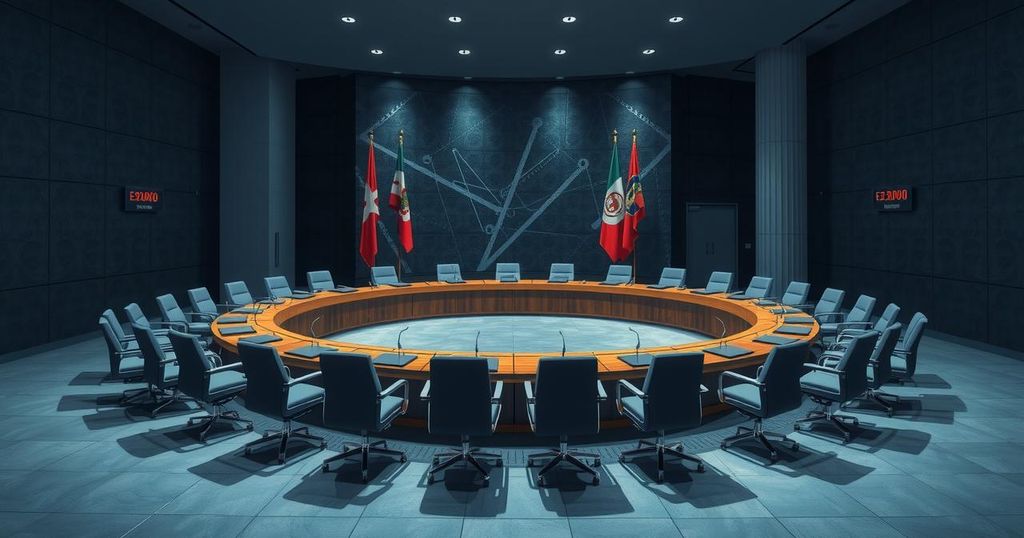South Africa Faces Diplomatic Challenges Following Ambassador’s Expulsion
Diplomatic tensions are rising in South Africa following the expulsion of Ambassador Ebrahim Rasool, prompting President Cyril Ramaphosa to consider a new appointee. The government is focused on improving relations with the Trump administration and navigating domestic and international pressures, including a proposed street renaming that could exacerbate tensions. Key actions are being taken to restore dialogue and clarify South Africa’s position in global affairs.
As diplomatic tensions escalate, President Cyril Ramaphosa of South Africa is confronted with the challenge of appointing a new ambassador following the expulsion of Ebrahim Rasool. Rasool, previously serving as South Africa’s ambassador to the US, was declared persona non grata for derogatory remarks aimed at President Donald Trump, prompting significant diplomatic fallout.
On March 20, 2025, Vincent Magwenya, spokesperson for the Presidency, reported that Rasool needed to leave the US by March 21. “Washington described Rasool’s remarks as obscene and lacking respect,” Magwenya stated, highlighting the complexity of the diplomatic situation. President Ramaphosa is now considering potential candidates for the ambassadorship, underscoring the importance of a measured approach during these trying times.
Amid this political backdrop, Ramaphosa is focused on restoring relations with the Trump administration, recognizing the potential for improved trade opportunities that are central to South Africa’s foreign policy. “Of course, the president is concerned about the current state of relations with the United States,” noted Magwenya, reflecting Ramaphosa’s intent to engage actively with US representatives at multiple levels.
The broader circumstances surrounding Rasool’s expulsion includes South Africa’s Expropriation Act and contentious legal proceedings against Israel. Nevertheless, Magwenya reassured that diplomatic engagement would persist despite the absence of an ambassador, emphasizing the open channels of communication.
Additionally, a proposal by the Johannesburg City Council to rename Sandton Drive in honor of Palestinian activist Leila Khaled has raised concerns about further straining US relations. The State Department has warned that such a renaming could potentially lead to the closure of its consulate located on that street.
Addressing the sensitive issue of street renaming, Magwenya exercised caution. “The renaming of streets remains one of our democratic society’s redress of the past injustices of colonialism and apartheid,” he acknowledged, while also recognizing the need for diplomatic sensitivity. Ramaphosa has urged prudence in managing the situation to prevent further escalation of the diplomatic crisis.
In light of these developments, the African National Congress (ANC) plans to hold a welcoming rally for Rasool in Cape Town. However, the Presidency has voiced concerns over such celebrations. “We are urging some kind of restraint, recognizing the prevailing conditions,” Magwenya said, which indicates a desire to discourage provocative comments during the event.
Moreover, the Democratic Alliance (DA) is calling for a reassessment of South Africa’s foreign policy amidst the current coalition government’s diminished majority. This recommendation reflects the intricate domestic political dynamics affecting the nation’s stance on international relations.
The Ramaphosa administration has characterized the strained relations with the US as a minor setback, outlining specific diplomatic strategies moving forward. Magwenya detailed four actions, including exercising restraint regarding Rasool’s return, addressing the street renaming proposal, delaying US delegations until trust is established, and rectifying misunderstandings in the US narrative about South Africa.
These initiatives aim not only to mend ties with Washington but also to clarify South Africa’s domestic policy narrative, particularly on land reform. Public Works and Infrastructure Minister Dean Macpherson reiterated that no expropriations without compensation have occurred in the last decade, emphasizing the government’s commitment to transparency.
Ultimately, as Ramaphosa endeavors to revitalize constructive dialogue with the US, he must adeptly balance the domestic political landscape with international expectations. South Africa’s commitment to its historical partnerships, even with countries like Iran that face US criticism, is evident. Magwenya reaffirmed that South Africa would not sever its ties based on US perspectives, underscoring the importance of sustained international relationships.
As these diplomatic challenges unfold, the coming weeks will be crucial for Ramaphosa to navigate the complexities of South Africa’s international relations while safeguarding national interests.
In summary, President Cyril Ramaphosa confronts the challenge of restoring South Africa’s diplomatic relations with the United States following the expulsion of Ebrahim Rasool. The government is strategically considering its approach, including caution regarding the renaming of streets and the handling of domestic pressures. The administration’s commitment to transparency and sustained international partnerships remains pivotal as it seeks to redefine its foreign policy in a complex political landscape.
Original Source: evrimagaci.org




Post Comment